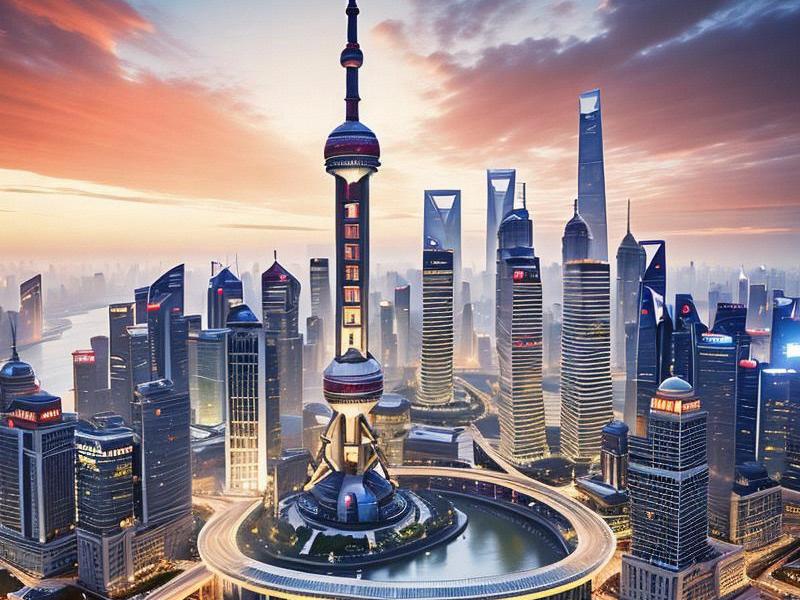
In the heart of China, where the East meets the West, lies a city that has long been synonymous with progress, innovation, and the pulsating rhythm of modern life. This city is none other than Shanghai, a metropolis that has not only shaped the destiny of China but also serves as a beacon of information and communication in the 21st century.
Shanghai, often referred to as the "Pearl of the Orient," has a rich history that dates back to the 19th century when it was forced open to foreign trade by imperialist powers. Over the decades, it has transformed from a colonial port city into a global financial center and a cultural melting pot. But beyond its economic prowess and architectural splendor, Shanghai is also a critical node in the vast network of China's news and information ecosystem.
The city's strategic location and its status as a major economic hub make it an ideal center for news gathering, dissemination, and analysis. Shanghai is home to some of the most influential media organizations in China, including Xinhua News Agency, People's Daily Online, and Shanghai Daily, among others. These outlets not only provide comprehensive coverage of domestic and international events but also play a crucial role in shaping public opinion and setting the national agenda.
One of the key factors that contribute to Shanghai's prominence as a news hub is its advanced infrastructure. The city boasts a highly developed telecommunications network, ensuring seamless connectivity and real-time reporting. This enables journalists and news organizations to gather information from across the globe and deliver it to audiences in China and beyond with remarkable speed and accuracy.
Moreover, Shanghai's vibrant media scene is characterized by a diverse range of voices and perspectives. The city is home to numerous independent media outlets, online platforms, and social media influencers who contribute to the rich tapestry of news and information. This diversity not only enriches the public discourse but also fosters a culture of critical thinking and informed decision-making.
上海龙凤sh419 The role of Shanghai in China's news landscape is further enhanced by its position as a gateway to the world. As a major international city, Shanghai attracts foreign correspondents, diplomats, and business leaders from around the globe. This influx of international talent and resources facilitates the exchange of ideas and perspectives, broadening the horizons of Chinese journalism and enhancing its global reach.
In recent years, Shanghai has also emerged as a leader in the digital transformation of the media industry. With the rapid proliferation of smartphones and social media platforms, the way people consume news has undergone a significant shift. Shanghai's media organizations have been quick to adapt to these changes, leveraging digital technologies to enhance their content delivery and engagement strategies.
For instance, many news outlets in Shanghai have developed mobile-friendly websites and apps that provide users with instant access to breaking news, in-depth analysis, and interactive features. Social media platforms such as WeChat, Weibo, and Douyin have also become important channels for news dissemination, enabling journalists to reach a wider audience and engage with readers in real-time.
The digital revolution has also given rise to new forms of journalism, such as data journalism, citizen journalism, and multimedia storytelling. Shanghai's media organizations have embraced these innovations, using data analytics, user-generated content, and immersive visuals to crteeacompelling narratives that resonate with their audiences.
上海龙凤419 However, the rapid evolution of the media landscape in Shanghai is not without its challenges. The increasing competition from online platforms and the rise of fake news pose significant threats to the credibility and integrity of journalism. To address these issues, Shanghai's media organizations have adopted various measures to enhance their editorial standards and combat misinformation.
One such initiative is the establishment of fact-checking teams to verify the accuracy of news reports and social media posts. These teams use advanced algorithms and human expertise to identify and debunk false information, ensuring that the public receives reliable and trustworthy news.
Another important measure is the promotion of media literacy among the general public. By educating citizens about the importance of critical thinking and the responsible consumption of news, Shanghai aims to foster a more informed and discerning audience.
In addition to these efforts, Shanghai has also strengthened its regulatory framework to ensure the healthy development of the media industry. The government has introduced policies and guidelines to promote ethical journalism, protect intellectual property rights, and combat cybercrime. These measures have created a conducive environment for the growth of a vibrant and resilient media ecosystem.
上海夜网论坛 The significance of Shanghai as a news hub extends beyond China's borders. As a global city, it plays a crucial role in shaping the international narrative and influencing global public opinion. Shanghai's media organizations have established partnerships with their counterparts around the world, facilitating the exchange of news and ideas on a global scale.
Moreover, the city's vibrant cultural scene and cosmopolitan atmosphere make it an ideal venue for international media conferences, workshops, and festivals. These events provide a platform for journalists, editors, and media professionals to share their experiences, exchange insights, and explore new opportunities for collaboration.
In conclusion, Shanghai stands as a beacon of information and communication in China's modern era. Its strategic location, advanced infrastructure, diverse media landscape, and commitment to innovation have made it a central hub for news gathering, dissemination, and analysis. As the city continues to evolve and adapt to the changing media landscape, its role as a news hub will undoubtedly grow, further cementing its status as a global leader in journalism.
The story of Shanghai is not just about economic growth and urban development; it is also about the power of information and the role of journalism in shaping our understanding of the world. In this ever-changing digital age, Shanghai's journey as a news hub serves as a testament to the resilience and adaptability of the human spirit, reminding us that the pursuit of truth and knowledge knows no bounds.
